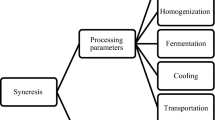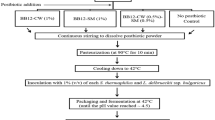Abstract
A proteolytic enzyme from Bacillus pumilus strain TYO-67, which was able to coagulate the protein in soybean milk, was characterized enzymologically. The optimum pH and temperature for its activities were 9.0 and 50 °C, respectively. The enzyme was strongly believed to be a serine proteinase because it was completely inhibited by the addition of diisopropyl fluorophosphate or phenylmethanesulfonyl fluoride. Hammerstein milk casein, cytochrome c and soybean protein were good substrates for the enzyme. Seven cleavages were detected using the oxidized insulin B-chain as peptide substrate for the proteolytic specificity test of the serine proteinase from B. pumilus. The bonds most susceptible to the action of the serine proteinase from B. pumilus were Leu-15–Tyr-16. The mode of action on soybean milk protein by the enzyme from B. pumilus was also investigated. The acidic subunit in glycinin and the α′-, α- and β-subunits in β-conglycinin were degraded during the enzyme reaction. However, the basic subunit in glycinin could not be degraded by the enzyme. The formation of coagula in soybean milk caused by the serine proteinase from B. pumilus was mainly due to the hydrophobic interaction.
Similar content being viewed by others
Author information
Authors and Affiliations
Additional information
Received: 9 July 1999 / Received last revision: 22 October 1999 / Accepted: 5 November 1999
Rights and permissions
About this article
Cite this article
Aoyama, M., Yasuda, M., Nakachi, K. et al. Soybean-milk-coagulating activity of Bacillus pumilus derives from a serine proteinase. Appl Microbiol Biotechnol 53, 390–395 (2000). https://doi.org/10.1007/s002530051631
Issue Date:
DOI: https://doi.org/10.1007/s002530051631




